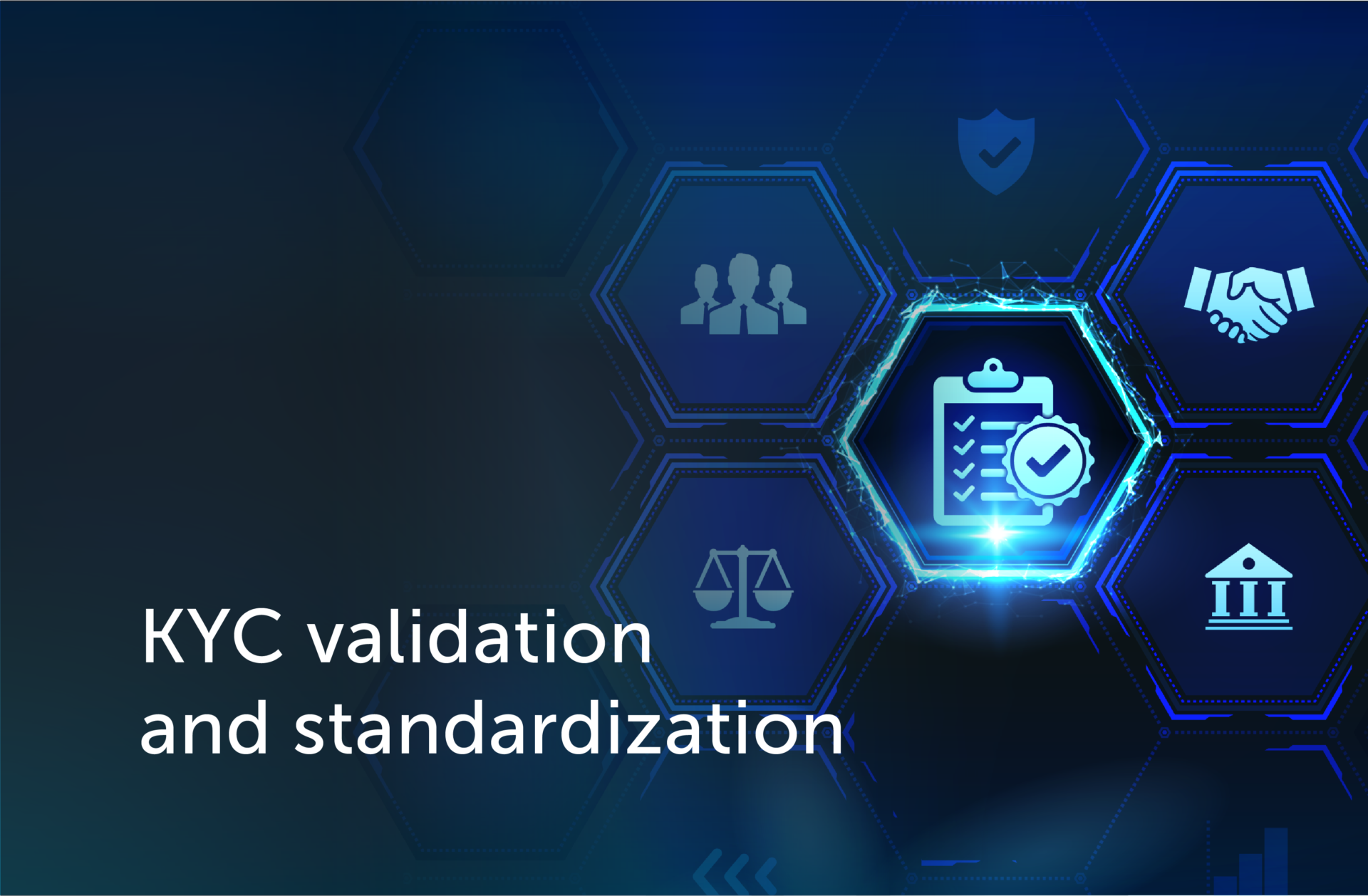The case for validation and standardization in KYC

Financial institutions face significant hurdles in enhancing their Know Your Customer (KYC) processes.
Data inconsistencies, regulatory complexity, and inefficiencies hinder growth and client satisfaction.
Transforming KYC: Overcoming challenges and unlocking growth
Addressing these challenges requires a transformative approach that prioritizes robust validation and industry-wide standardization for KYC. Overcoming these issues will revolutionize KYC, enabling banks to improve compliance, reduce costs, and deliver seamless client experiences.
Beyond verification: The case for validation
Effective KYC depends on authenticating and validating entity data. However, many banks focus solely on verification, confirming the existence of an entity. While necessary, verification alone does not ensure compliance or mitigate risks.
Validation goes further by assessing the accuracy, legitimacy, and consistency of verified data. It cross-references multiple trusted sources to uncover discrepancies or outdated information. Without validation, financial institutions risk relying on incomplete or inaccurate data, exposing themselves to financial crime, fines, and reputational damage.
Key benefits of validation include:
- Identifying inconsistencies and inaccuracies early
- Strengthening trust in client profiles, reducing risks
- Laying a foundation for secure, streamlined onboarding processes
The power of Corporate Digital Identity (CDI)
Corporate Digital Identity (CDI) is a game-changer for corporate KYC. CDI provides a ‘container’ by building a profile for standardized KYC attributes that consolidates and digitizes entity information that can be used for KYC verification with a clear and reliable picture of corporate clients. This not only streamlines onboarding but also reduces reliance on manual, error-prone processes.
With CDI, banks can detect and prevent financial crime more effectively, simplify compliance across jurisdictions, and enhance client experiences by minimizing delays and friction.
Moreover, CDI fosters collaboration among industry players, creating a united front against fraud and money laundering. By elevating resilience across the financial sector, CDI serves as a cornerstone for innovation and trust.
Why standardization for KYC is the missing link
The lack of a unified framework for entity verification and validation creates inefficiencies and risks across the financial industry. Inconsistent processes lead to higher compliance costs, customer frustration, and increased regulatory gaps.
Standardization resolves these issues by establishing universally accepted guidelines for data collection, verification, and validation. It delivers:
- Streamlined onboarding by reducing redundancies
- Enhanced compliance with clear regulatory alignment
- Cost savings by minimizing bespoke solutions
Recognizing the importance of standardization, industry coalitions such as the Financial Services and Markets Board (FSMB) and the Centre for Finance, Innovation and Technology (CFIT) are advocating for unified standards in business entity verification attributes and processes. Their efforts aim to create adaptable frameworks aligned with key KYC procedures, regulations, and compliance laws. This collaborative approach ensures that financial institutions can operate efficiently while meeting evolving regulatory demands.
Technology as the catalyst
Emerging technologies including artificial intelligence (AI), automation, and blockchain are reshaping KYC, driving efficiency and accuracy.
- Automation and AI enable faster data analysis, fraud detection, and anomaly identification, reducing manual effort
- Blockchain provides tamper-proof, transparent records that support the use of CDI
- Intelligent document processing accelerates onboarding by digitizing and validating documents in real-time
When integrated into a standardized framework, these technologies future-proof financial institutions against regulatory changes and cybercrime threats.
A unified approach to growth and innovation
To thrive in today’s dynamic landscape, financial institutions must embrace a holistic approach to KYC. By combining CDI, validation, and standardization, banks can:
- Build trust through accurate, consistent data
- Stay ahead of regulatory changes with adaptable frameworks
- Deliver superior client experiences, fostering loyalty and growth
With the support of forward-thinking industry coalitions and advanced technology, banks can embrace innovation while maintaining compliance.
The future of financial services lies in adopting robust validation processes, advocating for standardization for KYC, and leveraging CDI. By doing so, financial institutions can unlock new opportunities for growth and innovation while safeguarding their operations against risk.
Discover corporate digital identity from Encompass